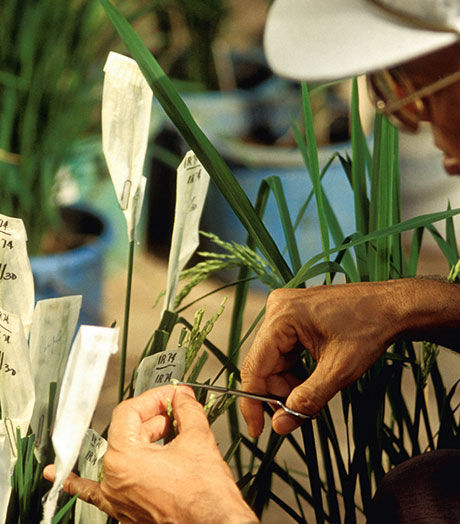The International Rice Research Institute (IRRI) is a non-profit agricultural research and training center based in Los Baños in the Philippines, whose goal is to improve the quality of life of communities where rice is a subsistence food. Founded in 1960 with support from the Ford and Rockefeller Foundations and the Philippine government, today’s IRRI enjoys the partnership of numerous agricultural and food institutions, as well as other non-profit organizations like the Bill and Melinda Gates Foundation.
IRRI is Asia’s premier non-profit agricultural research and training organization. Most of its research is carried out in partnership with local farming research and development agencies, and with other rice-producing organizations worldwide. In 1970, IRRI was distinguished with the UNESCO Science Prize.
Speech
Development Cooperation, 3rd edition
By the middle of this century, the number of individuals inhabiting our planet will have climbed from 6.8 to 9.1 billion. Will there be food enough for all? Studies by the United Nations Population Division and the Food and Agriculture Organization (FAO) conclude that there will. But it won’t be easy. Guaranteeing food security with today’s agricultural system and crops would require a large increase in cultivable land, above all in Asia and Latin America, and more use of fertilizers, pesticides and, especially, water, already a scarce resource across large areas of our planet.
Hardly what we would call the most sustainable of strategies. And, of course, climate change processes must also be factored into the equation, including such likely manifestations as changing rainfall patterns, prolonged periods of drought and flooding. The solution, then, is to produce more with less, using crops that require less water and agrochemicals but yield considerably more per unit of land. Can this be done?
The good news is that humanity has already succeeded once in eliminating a bottleneck in food supply. The world population doubled between the early 1970s and the first decade of the 21st century, yet agricultural production was able to keep pace. According to the FAO, between 1970 and 2005, the percentage of undernourished people in developing countries dropped from over 30% to 15%. Much of this success was due to the International Rice Research Institute (IRRI), winner of the 2010 BBVA Foundation Frontiers of Knowledge Award in the Development Cooperation category. And many are hoping that they can achieve a similar feat in the decades to come.
The International Rice Research Institute is a non-profit agricultural research and training center based in Los Baños in the Philippines, whose goal is to improve the quality of life of communities where rice is a subsistence food (summing more than half of the world’s population). Currently, average annual consumption of rice is 108 kilos per inhabitant in Asia, dropping to 33 kilos in sub-Saharan Africa. Again according to the FAO, a total of 151 million hectares worldwide are given over to rice cultivation, of which 132 million are in Asia and 8 million in Africa.
Back in the 1950s, there was a real fear that population growth in Asia could bring about a situation of famine. It was to confront this risk that the IRRI was founded in 1960, with the support of the Rockefeller and Ford foundations and the Philippines government.
And confront it they did. The IRRI has played an instrumental role in boosting rice production levels, especially in Asia. Through an intense research effort and commitment to knowledge transfer from the laboratory to the farm, the Institute’s scientists have introduced higher-yielding rice varieties that are more disease resistant and use less water. Nowadays, the IRRI is continuing its efforts to improve agricultural productivity, while investigating ways to reduce the pesticide use and environmental damage associated with rice cultivation in the past.
The IRRI has also set up the International Rice Genebank, the largest in the world, whose more than one hundred thousand types of cultivated and wild rice provide important insurance against biodiversity loss. This bank is a resource for researchers using traditional and biotech methods to search for rice varieties able to resist the vicissitudes of climate change, to take just one highly pertinent example.
Another facet of the Institute’s work is its role in training farmers and agricultural researchers in developing countries. This is vital, since one of the main improvement channels for productivity is to export modern agricultural methods and technologies to the areas where they are most needed.
The jury of the 2010 BBVA Foundation Frontiers of Knowledge Award in the Development Cooperation category cited IRRI’s contribution to “reducing poverty and hunger in the world by means of rice research and farmer training.” The IRRI, it concluded, “stands as a clear example of scientific research applied to development goals.”
The IRRI was also commended for its success in “transferring the results of its research, by working with local teams and organizations in Asian and sub-Saharan countries, and making its varieties freely available to farmers.” By this means, in the words of the citation, “it has secured the effective dissemination of its innovations with the resultant increase in production of this basic crop.”
Today’s IRRI enjoys the partnership of numerous agricultural and food institutions, as well as other non-profit organizations like the Bill and Melinda Gates Foundation. It has recently begun to extend its scientific and training efforts to parts of Africa and Latin America.
The global market for rice continues to expand. And forecasters say that output will have to increase by around 70% in the next two decades just to keep up with demand. The lessons of IRRI’s experience will be an important part of that story.


